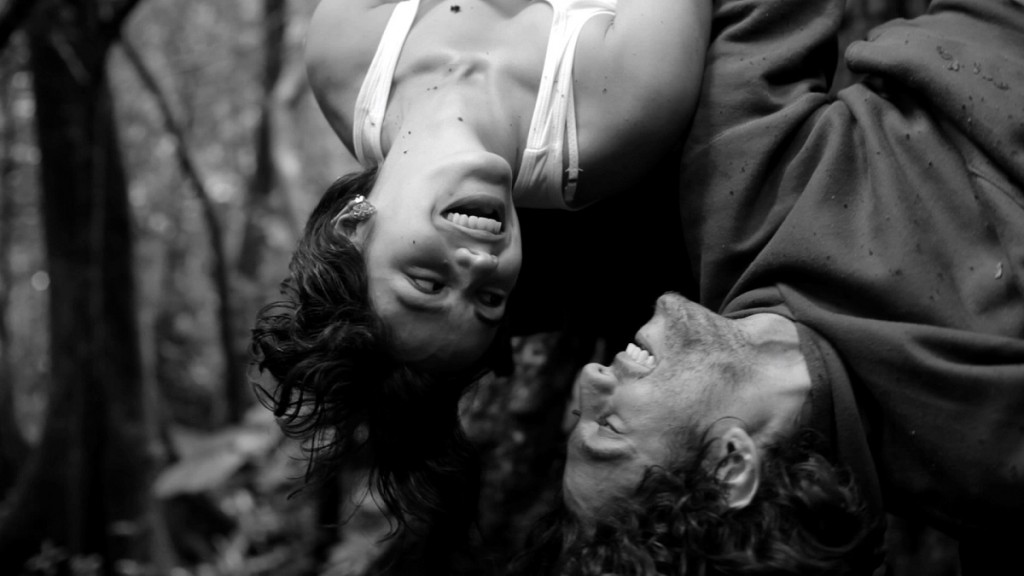Tribeca Reviews: ‘Viaje’ — Love & Other Adult Problems

Pictured: Kattia Gonzalez and Fernando Bolaños in “Viaje.” Photo: Esteban Chinchilla.
As Luciana and Pedro, two inebriated millennials, banter over how to avoid morphing into their annoying friends with children, their cabbie wags his finger and declares that raising a child is “the most important thing you can do.” Luciana gets out of the cab and vomits. Such is the visceral reaction to commitment and parenting in Viaje, the latest film by award-winning director Paz Fábrega (Agua Fria de Mar, 2010). In 70 brief minutes, Fábrega has created a masterful exposé on the complexities of short-lived, intense sexual encounters and leaves us desperate for more. In Spanish, with English subtitles, the feature had its world premiere at this year’s Tribeca Film Festival.
After meeting at a costume party (Pedro dons a cuddly bear suit; the meaning of Luciana’s (non)costume only to be revealed at the end of the film), Luciana decides to join Pedro at his research base camp for one last night before he disappears into the woods for three weeks. Fábrega, a native of Costa Rica, chooses the exquisite Rincón de la Vieja National Park as the playground for Luciana (portrayed by the unassuming Kattia González) and Pedro (played by the coy Fernando Bolaños) to explore their natural inclinations.
Despite their age and throbbing sexual attraction, the two are more like grade-schoolers, hopscotching around their newfound, yet-to-be consummated intimacy by climbing trees, chasing each other through the jungle, and floating in mineral pools. Cinematographer Esteban Chinchilla, shooting in black and white, allows the landscape to speak a language all its own: wild and uncontrollable. But it soon becomes the language of love. Luciana and Pedro’s trip (“viaje”) is both literal and figurative as they embark on a journey into the wilds of nature and adulthood. The languorous chemistry between them effervesces like steam rising from the hot springs, and their childlike nature cautiously burgeons into one of unyielding passion. They are no longer children but adults.
Or are they?
A brief romp in the tent has created troubles for Luciana, who misses the last bus into the city. Forced to stay with Pedro for a few more nights, she must face her greatest fear (and she has many): commitment. Unable to run away from “her last fling,” as Pedro calls it, before moving to London to be with an absentee boyfriend, Luciana shuts down. González embraces her character’s ambivalence — that rock of dread that sits at the bottom of your stomach when you realize you’re faced with the unknown: wanting something you can’t figure out how to have or if you even want it — and gives a remarkable performance in the shadows of their tent and shared confusion.
The two actors slip into their roles as if they’d been playing them since childhood — natural, inconspicuous, shy even, as they explore and investigate each other. Their repartee, in large part due to Fábrega’s sassy, bright screenwriting, is as vibrant and lively as the remote Vieja landscape is serene. This juxtaposition ping-pongs back and forth with the vitality of springtime youth.
At the heart of the film are two confounding questions often encountered in adulthood: does sex change everything? And is it possible to have casual sex with no attachment? Neither Pedro nor Luciana seems to have enough life experience to handle the intensity of their attraction, let alone arrive at answers to those queries. (The audience is left to ponder those nagging questions well after the credits roll.) Their playfulness, so jovial pre-sex, disappears almost immediately as if frozen by what they had done. They arrive at the rustic barracks and stake out separate bunks. As night falls and the cacophonous symphony of birds and insects drops to a dull hum, Pedro perches himself on an upper mattress and flicks the light switch on and off like a half-hearted SOS call to the universe.
Where González succeeds at ambivalence, Bolaños succeeds at the art of letting go. At one point, they toy with the idea of staying together, but all Luciana can cobble together is concern for what she will do while he’s working in the field. When not acting and directing, Bolaños is a yoga instructor, and his portrayal of Pedro embodies the practice, offering her suggestions but with the insouciance of a yogi.
The stunning landscape captured by Chinchilla’s innocent eye and the duo’s raw interactions create a stunning interpretation of love and the roads that take us there. If there’s a minor flaw in Fábrega’s directing, it’s in the very nuanced cultural references that might not be understood by the majority of non-Costa Rican filmgoers. In several scenes, Pedro affects various accents, which non-Spanish speakers only learn from notations in the subtitles. The accents do little to push the plot forward, yet their inclusion runs the risk of breaking the flow like the interruption of a commercial.
Fàbrega opens the film with a quote from the great Mexican poet, Octavio Paz, “Everything belongs to the wind and the wind is air forever traveling.” Luciana and Pedro’s travels conclude as one might expect, but it’s not without the tenderness of a well-crafted love story — a story that’s been handed down through the ages in cultures across the globe.
Rating: A
Video courtesy of REMEZCLA.
“Viaje” had its World Premiere at the Tribeca Film Festival on April 16. For more information about the film, you can visit the TFF’s official Web site by clicking here.
